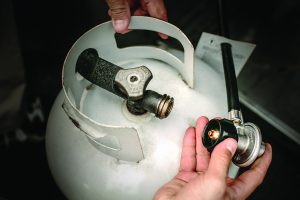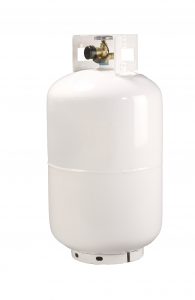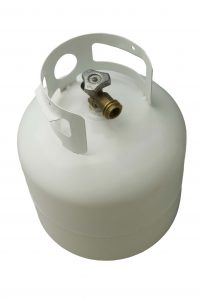Getting to Know Your Small Propane Cylinder – Important Safety Tips for 20, 30, & 40 lb. Propane Cylinders
Small propane storage cylinders can be used for a variety of home or residential applications. A 20 pound (lb.) cylinder is most commonly used to power your outdoor propane grill. This size cylinder can also be used to power your outdoor fire pit or your small space heaters. A 30 lb. propane cylinder is used for powering recreational vehicles but can also be used in commercial cooking applications, as can a 40 lb. cylinder. With so many effective uses for small propane cylinders, knowing the safety features of this equipment is important. Below are a few frequently asked questions including answers that will help you use your small propane cylinder safely.
Q: How should I store small cylinders?
A: NEVER store or place a propane cylinder indoors, in an enclosed area or in an area of excessive heat (120 degrees or higher) or near a stove, fireplace, or other heat source. Keep your cylinder(s) in a well ventilated area.
Q: How should I transport small cylinders?
A: ALWAYS transport and store a cylinder in a secure and upright position so it will not fall, shift, or roll. Close the cylinder valve and, if required, seal with a plug, even if the cylinder is empty. Keep tank in a well ventilated area. Remove the cylinder immediately when you reach your destination.
Q: What should I do if I have a problem with my cylinders or outdoor appliances?
A: DON’T RISK IT! Call your propane retailer – Delta Liquid Energy – or a qualified service technician for assistance.
Q: What should I do with my old or damage cylinders?
A: NEVER dispose of your propane cylinder by throwing it in the trash. Check to see if there are municipal programs for collection in your area, or contact your propane retailer for guidance on disposal of the cylinder.
Q: What should I do if I smell gas?
- Immediately put out all smoking materials and other open flames.
- If you are able to, safely turn off the cylinder valve. To close the valve, turn it to the right (clockwise).
- Immediately leave the area and call 911 or your local fire department.
- Before you restart the appliance, have a qualified service technician inspect your cylinder and appliance.
Q: How can I check for a leak in my small propane cylinder?

A: Checking your small propane cylinder for a leak is a quick and simple task. Add soapy water to a clean, unused spray bottle. Typically, dish soap will produce the best result. Use a spray nozzle with a sharp spray, rather than a mist. Spray the connection of your propane cylinder to the equipment, your barbecue for example. If small bubbles appear, this is in indication of a small leak. Larger bubbles will indicate a larger leak. Do not be alarmed by this, contact Delta Liquid Energy or bring your small cylinder to your nearest DLE location. NEVER use a match or open flame to detect a leak.
NOTE: Some people may have difficulty smelling propane due to their age (older people may have less sensitive sense of smell); a medical condition; or the effects of medication, alcohol, tobacco, or drugs. Consider purchasing a propane gas detector as an additional measure of security.
Oder fade is an unintentional reduction in the concentration of the odor of propane, making it more difficult to smell. Although rare, this can be caused by the presence of air, water, or rust in the cylinder. New and reconditioned small cylinders that sit too long before being filled are prone to internal rust when moisture and air get inside.


Source: www.propane.com & www.propane101.com